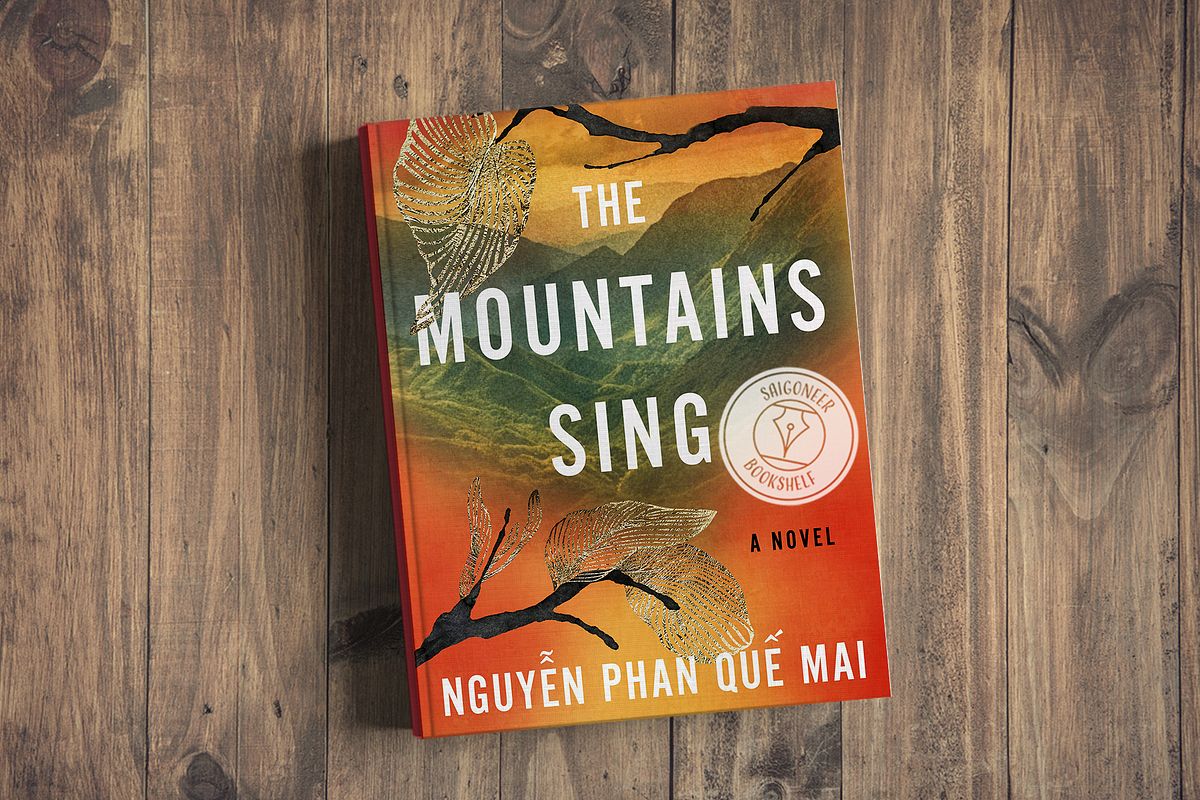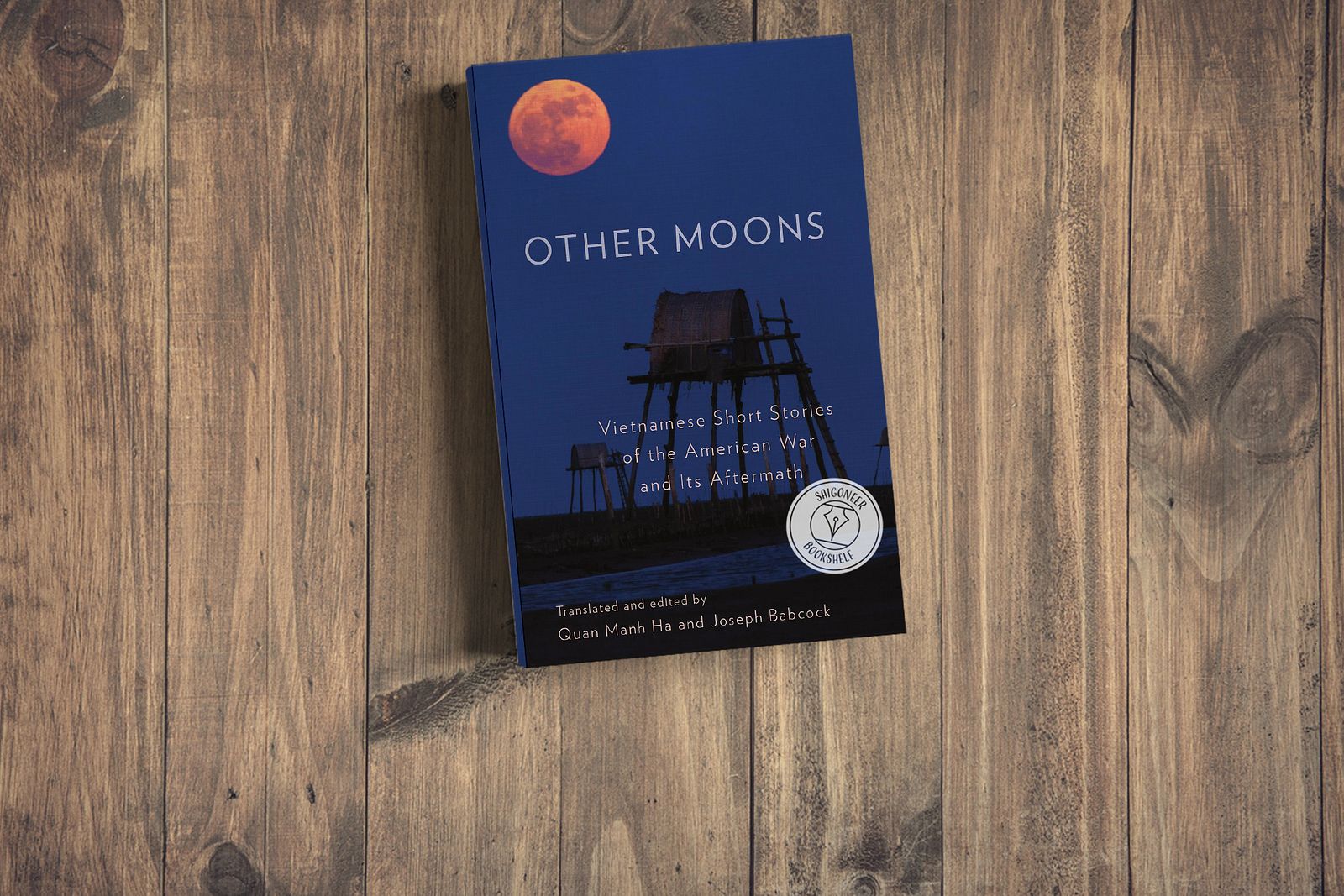As American bombers roared over the horizon preparing to drop fire and misery, air raid sirens screeched and people throughout Hanoi scrambled to find safety.
Hoping the invaders wouldn’t dare bomb children, one elderly woman brought her terrified grandson to a school. “We will only die if Buddha lets us,” was the most comforting statement she could possibly offer him in such a horrific moment.
That boy did indeed survive the war, and decades later offered the anecdote to writer Nguyễn Phan Quế Mai. She was working on a book about her experiences as a volunteer helping children with cancer in Hanoi’s pediatric hospitals, but upon hearing his story, put her manuscript away and wrote 2,000 words describing the experience he had shared. The scene eventually served as the opening chapter in what became her first novel, the beautiful, heartbreaking and utterly essential The Mountains Sing.
“If you talk to Vietnamese people, you’ll see that most have gone through tremendous events. Any Vietnamese family’s history can be written into a novel,” Quế Mai told me when we spoke last month. From Thi Bui and Dạ Ngân to Thanhha Lai and Ocean Vuong, many writers’ first novels are thinly veiled autobiographies, but that is not the case with The Mountains Sing.
That isn’t to say that the novel, which focuses on four generations of a Vietnamese family from French colonialism through land reform and the eventual reunification of the country, doesn’t draw considerably from Quế Mai’s life: “This book is a work of fiction, but some of the characters’ experiences rely heavily on the experiences of my family members. For example, my father’s mother was killed during the Great Hunger…My grandfather was beaten so horrifically during the land reform that he subsequently died.”
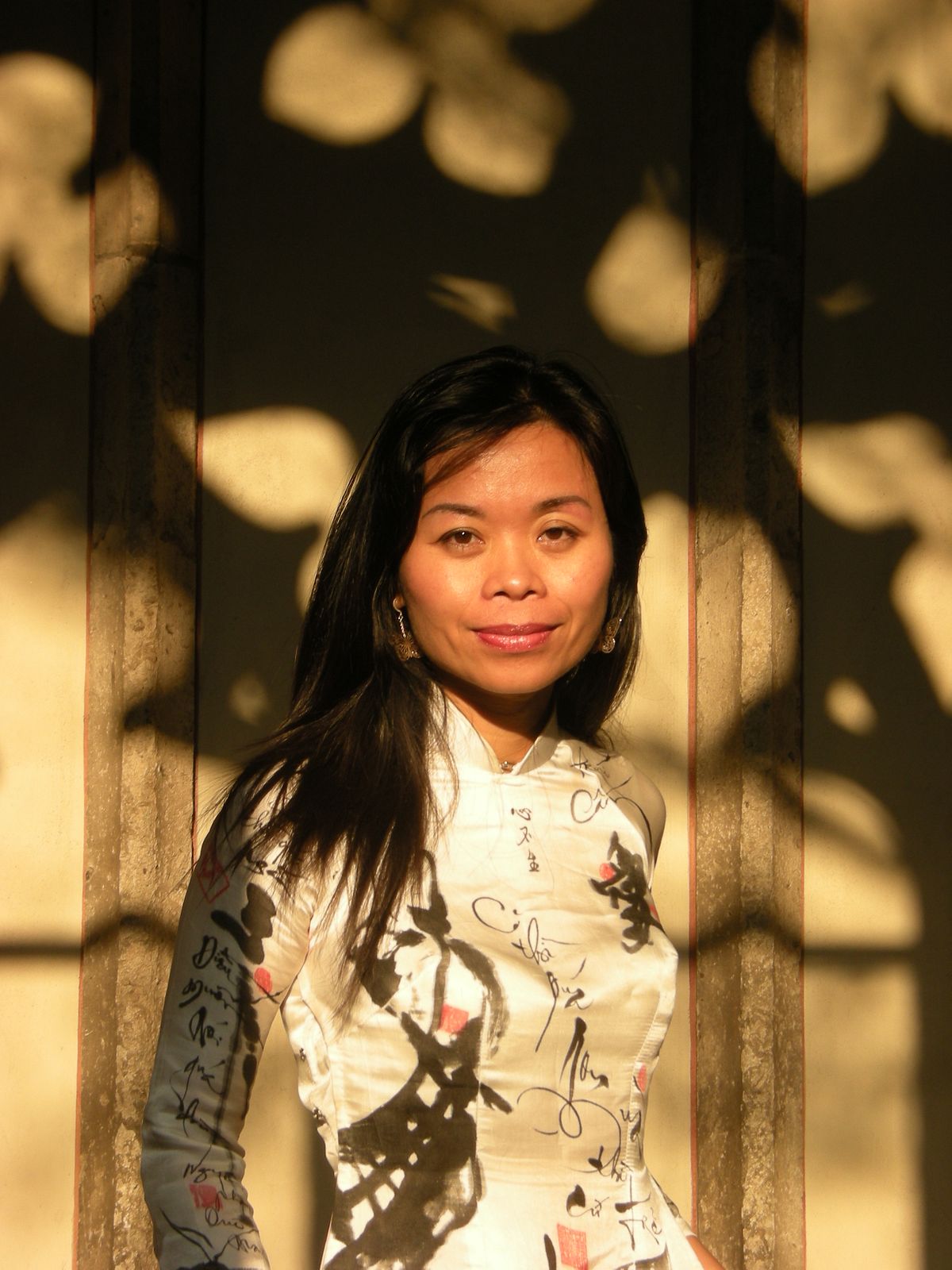
Photo by Vũ Thị Vân Anh.
Quế Mai weaves together some of those stories with imagined scenarios rooted in her yearning to have heard more. Her uncle “fought for the North Vietnamese army and he was a very, very sad man. When he was alive I wasn’t a writer yet, so I didn’t know what questions to ask. For The Mountains Sing, I interviewed many veterans and read many books so that I could imagine how it was for my uncle,” she explains, adding, “I never had a grandma. I was jealous of childhood friends whose grandmothers were telling them stories, so I told myself I’d one day write a book that has a grandmother who tells the granddaughter the stories of their family.”
Relying on her imagination, research and countless conversations with veterans and people who survived the war, Quế Mai created a complete and convincing world filled with heart-wrenching moments, including women longing for husbands whose whereabouts remain painfully unknown while countless other men trickle in from distant battlefields; packs of thieves prowling highways; rampant poverty that led people to eat banana stalks that were reserved for pig feed during peacetime; a veteran who loses his legs and turns to alcohol while pushing away the loved ones who want to help him recover; and children entrusted to nuns and street vendors to stave off starvation.
Vietnamese women, the ones who had to lead households and provide food for families while trying to give children a precious sense of normalcy during the war, shouldered an incredible burden, but their heroism is often passed over for tales that glamorize men’s combat theatrics. The Mountains Sing focuses on these women’s sacrifices. The Trần family is one of matriarchs, and their story is told primarily by Diệu Lan, who was born in 1920, and her granddaughter Huong, who entered the world in 1960. The novel leaps seamlessly forward and backward in time with Diệu Lan offering flashback memories of her own mother and father, a couple that grew up in comparative wealth in the north.
I never had a grandma. I was jealous of childhood friends whose grandmothers were telling them stories, so I told myself I’d one day write a book that has a grandmother who tells the granddaughter the stories of their family.
Their tale of rising and falling fortunes, sacrifice, and the immensity of political change upending all plans exemplifies the plight of many Vietnamese. Forces far beyond people’s control force them to become distrustful and duplicitous, selfish urges colliding with the depravities of self-preservation. And yet, amidst all the horror and hardship, love and romance have a place, reminding readers that tumult became a form of normalcy in which the enduring emotion thrived.
Quế Mai has a gift for specific details and anecdotes that reveal collective narratives. When one character refers to lacking a travel permit, readers are introduced to the challenges of internal migration that make the ease with which we can now traverse the country seem absurd. A few choice words reveal important contexts. When the grandmother notes with pride that her parents acquiesced to her refusal to blacken her teeth, for example, we understand not only the time period’s cultural transitions, but also the character’s independent mindset.
Who is this novel written for?
Amongst the many novels written about Vietnam’s bellicose 20th century, The Mountains Sing stands out for numerous reasons. It’s the first novel written in English by a Vietnamese citizen and published by a major publisher that, significantly, almost entirely ignores the presence of Americans; they don’t even get any speaking roles. “The war was essentially between the northern Vietnamese and southern Vietnamese. So much has been written about the Americans and they are always the center of attention, but I wanted to talk about the things that are deep and still very painful; the relationships between the Vietnamese,” Quế Mai shared.
The agency offered to Vietnamese characters, a very welcome change from the countless movies, books and documentaries that focus on American soldiers, should make it essential reading for foreign audiences who need a better sense of who also suffered during the war. For any visitor to Vietnam, the novel also serves as an ideal book to pick up before arrival, as it enables readers to intimately understand and appreciate the country’s history and culture.
But Quế Mai says: “I wrote this mostly for the people of Vietnam because I think we have been so divided over our long history and the division is not getting any better…I want to separate politics from country. I want to associate Vietnam with not just this painful history but a country of people, of emotions, of complications. I want Vietnamese to think more about the relationships amongst ourselves.”
I want to separate politics from country. I want to associate Vietnam with not just this painful history but a country of people, of emotions, of complications. I want Vietnamese to think more about the relationships amongst ourselves.
Quế Mai frequently laments stories not told and the great loss the silence represents. If people don’t talk about what they went through, misunderstandings, mistrust and discrimination linger. While many Vietnamese have stories like those contained in The Mountains Sing, they often don’t get passed down, whether because they are too difficult to return to, or because younger generations simply don’t know how important it is to ask for them. As the population ages, the potential for these tales to ever be shared is quickly vanishing. But as the grandmother in the novel explains to Hương, “History will write itself in people’s memories, and as long as those memories live on, we can have faith that we can do better.”
That quote exemplifies some of the power of the book. Quế Mai shared what she said was the greatest compliment she’s received about the novel so far: “A reader told me ‘when my mother was still alive, I did not think she loved me because she used to beat me and said ‘you cannot imagine how life was for me,’ reading your book, I finally understood her.’”
Fruit harvest from two languages
While she would be quick to deny it, stressing the importance of hard work and necessity, Quế Mai is a brilliant linguist, and I continue to be awed by her command of the language despite not having started learning English until she was in eighth grade. In a forthcoming essay and previous conversations, she says English ultimately was essential for writing The Mountains Sing. However fluent, a second language always remains at a certain distance for a person, which allowed her “to reflect calmly and objectively on the many historical events.”
Vietnamese is not absent from the text, nor the process of writing it, however. For example, at one point in the novel, a character divulges an incident of sexual assault and the immense feelings of shame, fear and loss that result. Quế Mai tried numerous times to write the scene, but could never achieve the right emotional urgency and despair. Switching to Vietnamese for the first draft gave her the voice she needed.
Vietnamese exists directly on the page as well: mẹ, trâu, nón lá, ruột tượng, đàn nhị, and numerous other words for food, plants, people, objects and places all exist in their Vietnamese with full diacritic marks. Retaining the tonal indicators in the novel and when writing her name represents a shift from most other works about Vietnam published in English. Quế Mai credits her editor and publisher at Algonquin in supporting the style choice, because while the use of full diacritic marks could make it less commercially viable because readers might think the characters’ names are difficult and confusing, Quế Mai refused to change her language to fit international reader’s eyes. She says, “I want to serve my reader an authentic meal of Vietnamese food, with chilies, lemongrass, ginger and fish sauce.”
Proverbs represent another important element of the Vietnamese culture that Quế Mai treasures. While western critics may shun familiar sayings as being clichéd or tired, in Vietnamese, they are important parts of daily speech and help form communal bonds between reader and writer built on shared knowledge. Therefore they appear numerous times in The Mountains Sing in both their original Vietnamese and English translations. When they discover their house has been destroyed, for example, the grandmother comforts her granddaughter by saying: “Trong cái rủi có cái may,” or “good luck hides inside bad luck.” So much of Vietnam’s collective spirit and beliefs can be packed into simple lines like “Heaven has eyes” or “Cruelty dispensed, cruelty returned” that the novel offers to explain the motivations of the characters.
Publishing across continents
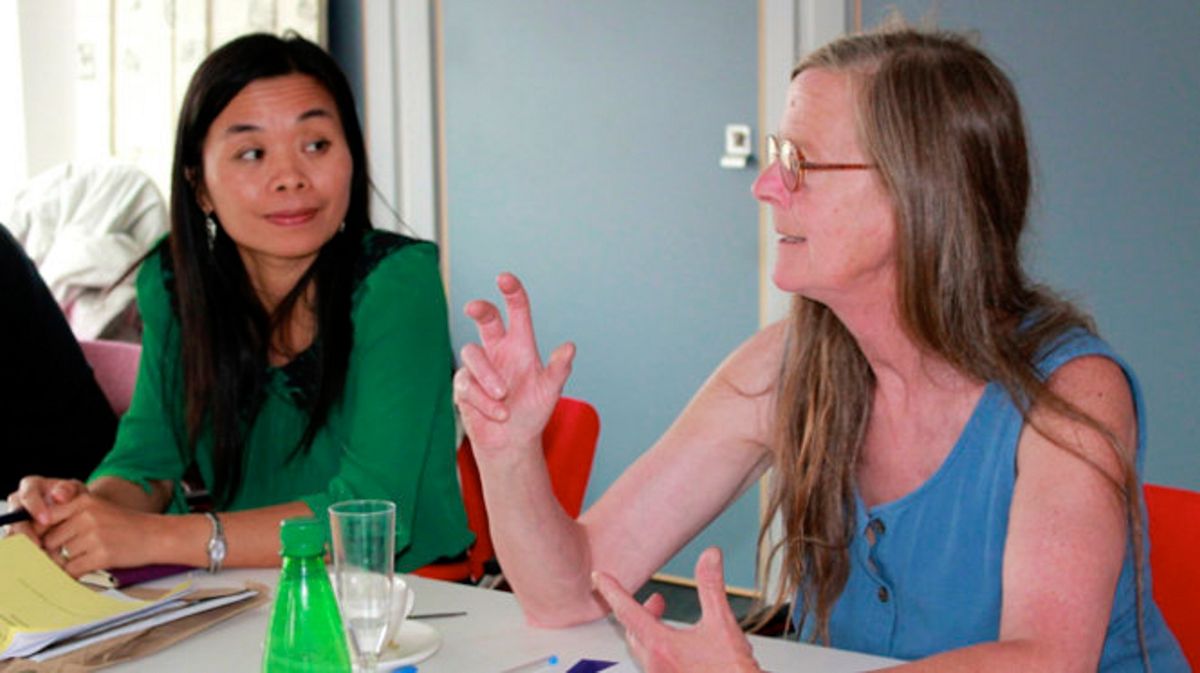
Quế Mai (left) with her mentor at Lancaster University, the novelist Sara Maitland (right).
Quế Mai has published numerous award-winning books in Vietnamese and is a frequent contributor to Tuổi Trẻ and other major Vietnamese newspapers. And although her stunning poetry collection, The Secret of Hoa Sen, was translated into English and released by an American press, the process to reach the international fiction audience was new and difficult. It took seven years to write and edit The Mountains Sing, and even though it was announced more than three years ago, it only arrives this spring because Quế Mai is a perfectionist and her editor, Betsy Gleick, offered many “visionary suggestions” that led to major revisions. Despite countless moments when self-doubt and the immensity of the task nearly drove her to abandon the project, Quế Mai pressed on, because “these are stories that need to be told — not for money, not for a career, not for any reason other than the fact that our history should not be forgotten.”
The book deal with Algonquin came about after Pulitzer Prize-winning Vietnamese-American writer Viet Thanh Nguyen obtained a copy of the synopsis and passed it along to one of the agents who sold his debut novel, The Sympathizer. Quế Mai says the support from Viet Thanh Nguyen and from the Diasporic Vietnamese Artists Network, which he founded together with the professor and critic Isabelle Thuy Pelaud, have been important pillars.
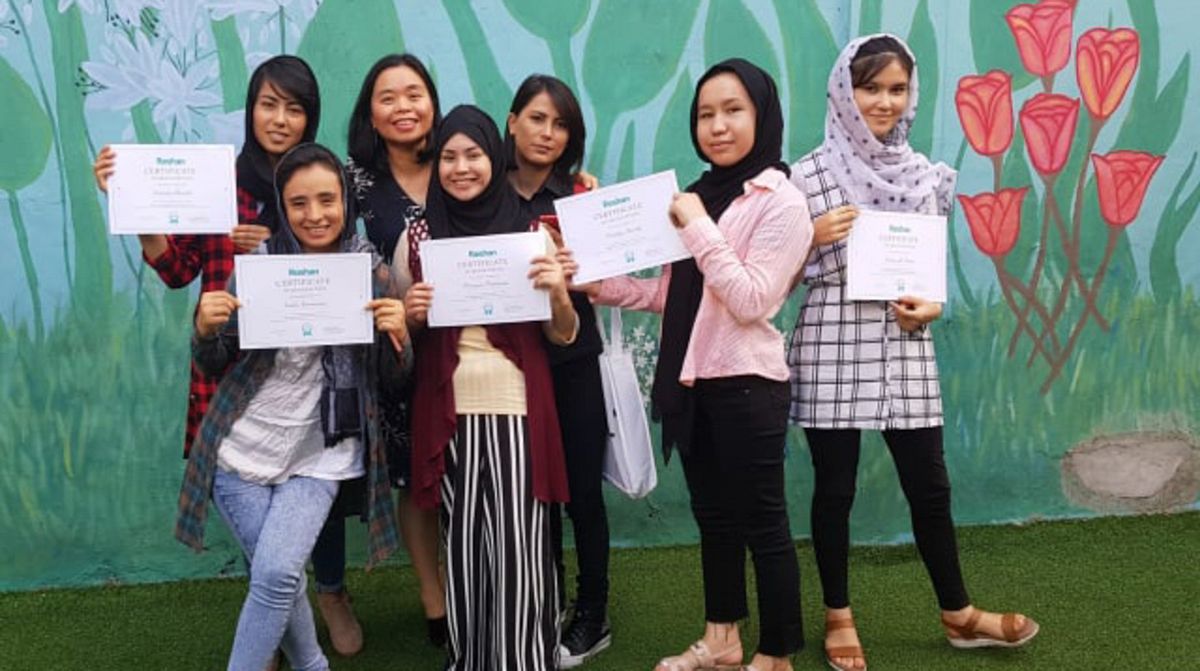
Quế Mai volunteering with Afghan refugees at the Roshan Center for Refugees, where she leads a weekly creative writing workshop.
When speaking with US-based National Book Award-winning writer Thanhha Lai about her novel Butterfly Yellow a few weeks ago, I apologized for the challenges our time zones caused in scheduling a Skype call. She laughed saying that being friends with Quế Mai means she no longer knows what a time zone is. The two “sisters-in-writing,” as Quế Mai puts it, offer each other feedback, bounce ideas off one another and puzzle through translations despite the ocean between them.
The short distance between Quế Mai, who now lives in Indonesia with her husband, a German diplomat, and Vietnamese writers around the world is revealed by the prominent voices who champion her work. The novel’s blurbs are a veritable who's-who of diaspora writers including Ocean Vuong, Mai Elliott, Thi Bui and, of course, Viet Thanh Nguyen and Thanhha Lai. Some of them will join her for discussions and readings when she travels to America and Canada this spring to meet her readers.
Thanhha admits that for many writers, a group that generally relishes their solitude, networking and forming relationships with their peers is a chore. For Quế Mai, however, it comes naturally and from a genuine place of wanting to share, learn and celebrate mutual passions. Perhaps no greater sign of her commitment to preserving and promoting Vietnamese literature exists than her work as curator for The Lanterns Sing, a radio program that includes the bilingual work of 18 Vietnamese poets set to music. Quế Mai spent several years translating poems for the project despite not receiving any payment. She also curated, translated and introduced Vietnamese poetry to western readers via a special edition of the literary journal Prairie Schooner.
It’s worth noting that since interviewing Quế Mai for an article which I wrote about her work more than a year ago, I’ve benefited immensely from the many Vietnamese writers she has put me in touch with and whose work she fiercely promotes. There hardly seems to be a month that passes where I am not sent an email or added to a Facebook group chat introducing me to a writer whose work I must read and then meet. Such a relationship has not only proven exceedingly rewarding on a personal level — opening my eyes to so many resonant works and writers I now consider friends — but has helped give Saigoneer access to authors that we might not otherwise have reached.
The necessity of healing
One author which Quế Mai told me I must read was her good friend Larry Heinemann, an American veteran who became a National Book Award-winning author. In an essay that she shared, he tells an anecdote about Mr. Lien, a professor of American Literature at Hanoi University, whose wartime task was to “go to Beijing and learn English, then go to Moscow University and study American literature. Then he came back to Hanoi, went out on the Ho Chi Minh Trail, and gave lectures on American literature to the troops traveling south.” Years after the war ended, Mr. Lien asked Heinamenn what Vietnamese literature the American army gave him and his fellow soldiers to better understand Vietnamese people. Heinemann could only laugh, “good and loud...at the deepest irony of the question.”
The stunning anecdote that reveals America’s arrogance and self-absorption seems simultaneously crazy and completely believable. Worse, the reality hasn’t changed much since. So while, in the words of veteran and novelist Wayne Karlin, “Nguyễn Phan Quế Mai brings herself to the forefront of those writers from Viet Nam who lately have gifted us the stories of a country and a people too often seen only as a backdrop for American pain,” there are many others who grew up with Apocalypse Now or The Things They Carried that still haven’t explored Vietnamese history through Vietnamese eyes. The Mountains Sing is the perfect cure for that condition.
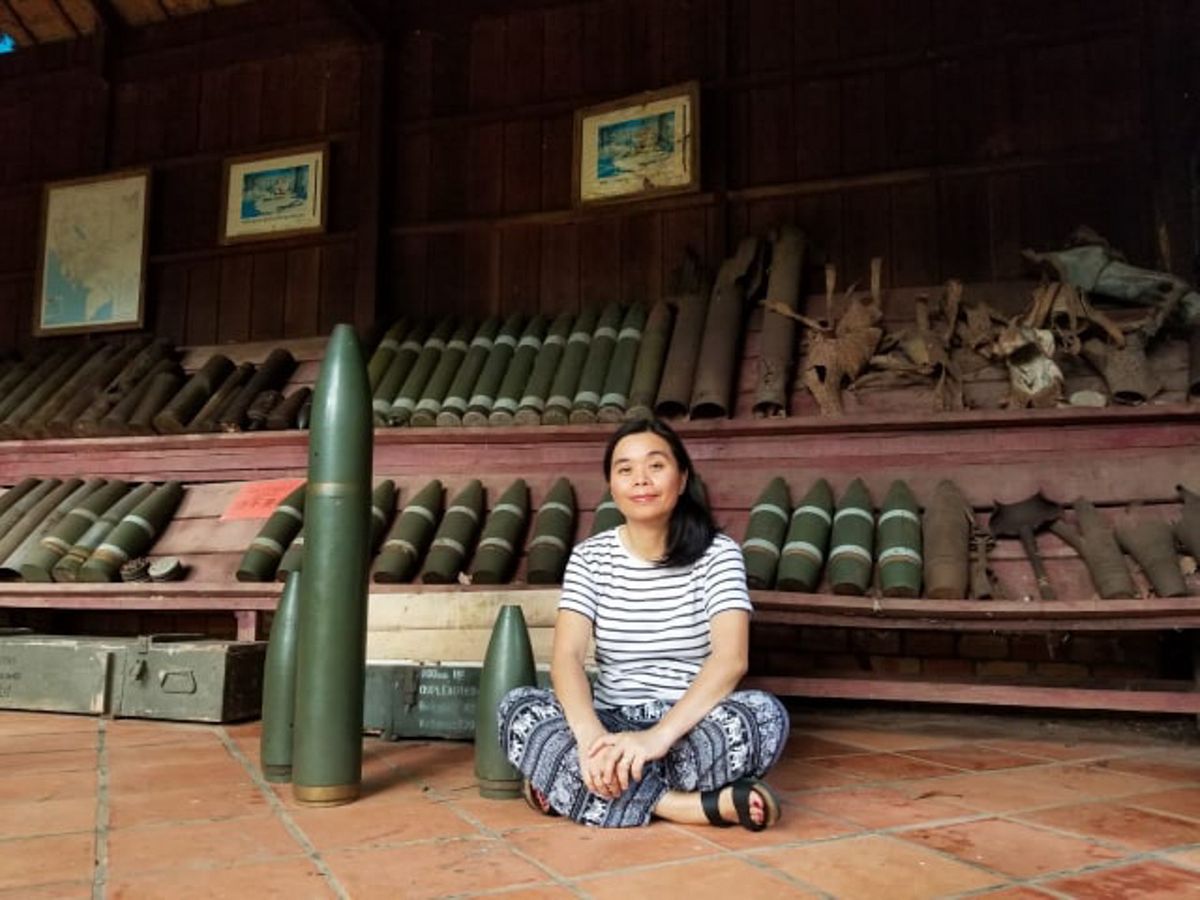
Quế Mai at a museum while researching for The Mountains Sing.
Heinemann passed away last month, and Quế Mai was brought to tears. She was hoping to see him one last time on her upcoming book tour. She noted in a beautiful obituary that their friendship was remarkable because he had fought against her uncle and in an army which had almost killed her parents with their bombs. But their friendship, which was able to transcend painful histories, reveals a bitter truth. Many Americans have had a chance to mend their relationship with Vietnam, and the trauma and PTSD our veterans experience is discussed and recognized. Such a privilege has not been afforded to Vietnamese who lived through the war. No comprehensive research in Vietnam exists for PTSD and war-related trauma and the book, therefore, provides an important spotlight on the issue.
I asked Quế Mai if she considers the characters in The Mountains Sing to be lucky. Without the need to think, she replied, “they are lucky because they can forgive people…We can only forgive if we look at things from other people’s perspectives and we sympathize and empathize. I think one of the messages of the book is to seek for more forgiveness. We need to forgive ourselves and we need to forgive others.”
The Mountains Sing is available internationally at a variety of retail outlets including independent bookstores while readers in Vietnam can access electronic versions such as Amazon Kindle. It has received many honors including the Lannan Literary Awards Fellowship for a work of exceptional quality and for its contribution to peace and reconciliation.

